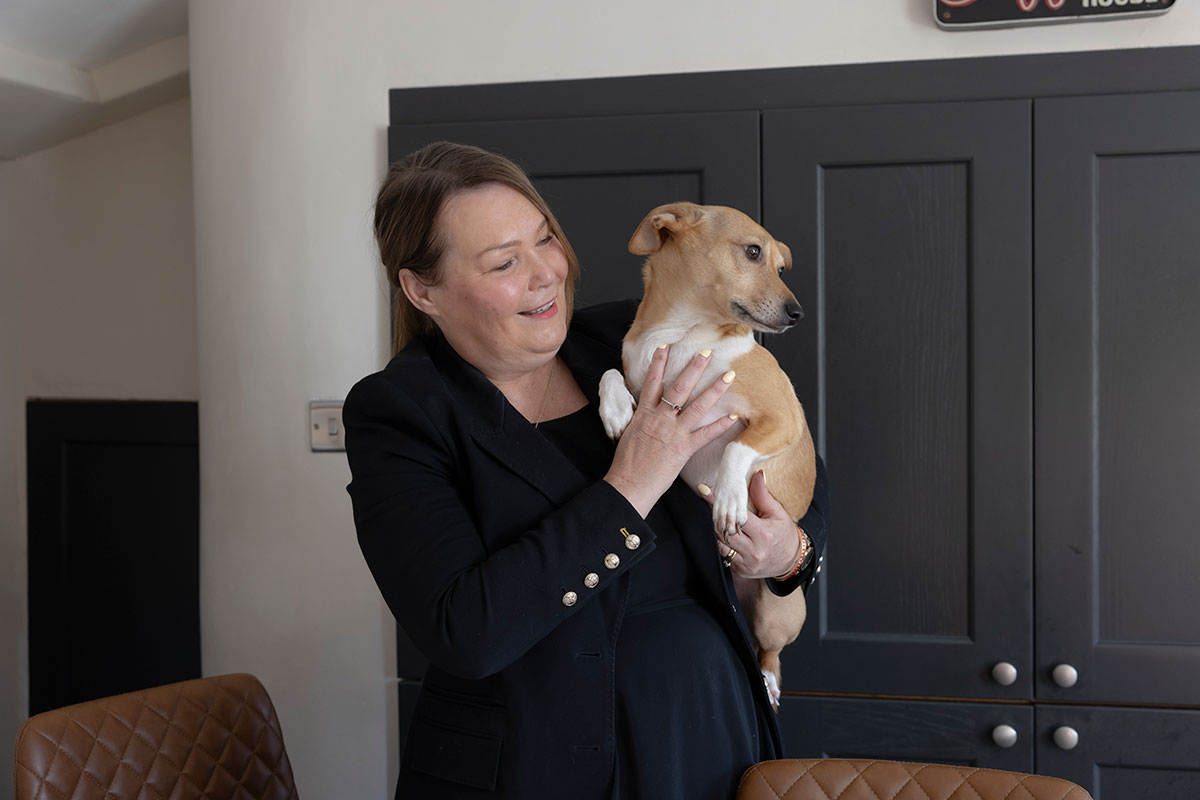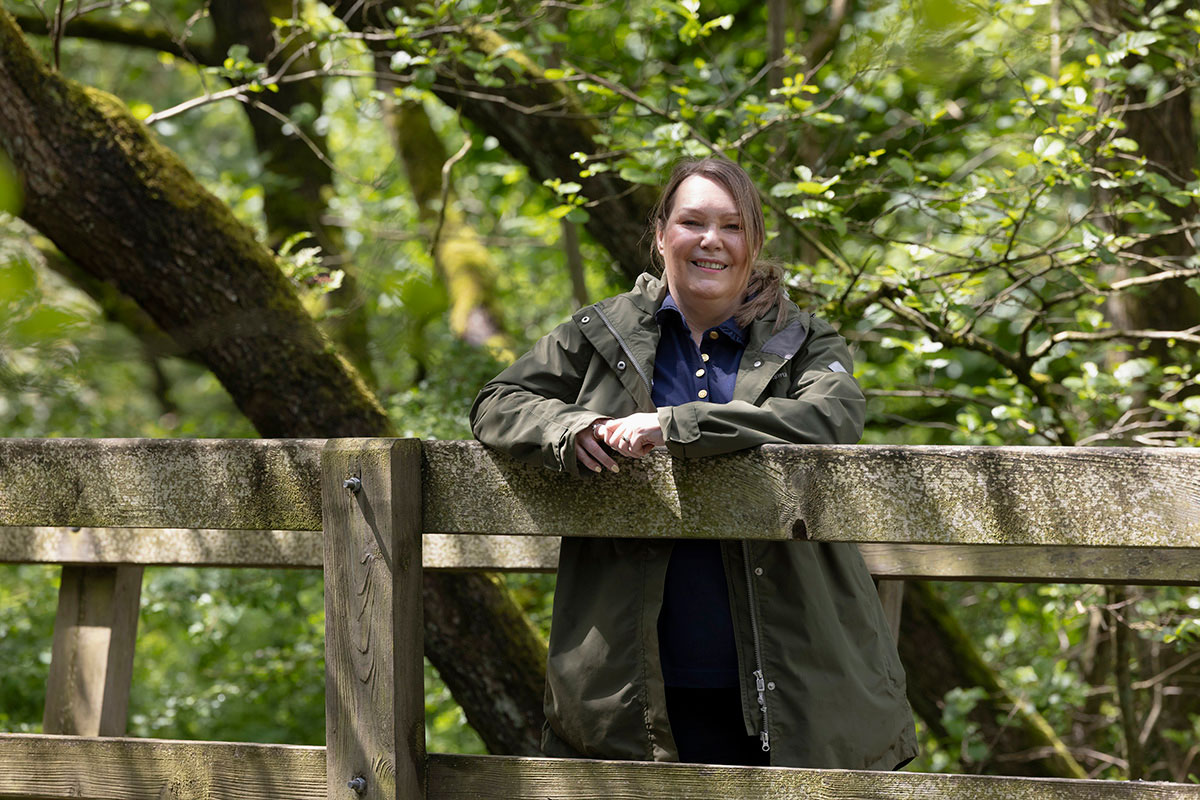You are viewing 1 of your 1 free articles
Your Housing chief’s mission to build housing careers
It has been less than two years since Jacque Allen took over as chief executive of housing association Your Housing Group, but she is already succession planning. Martin Hilditch talks to her about plans for a new leaders network and how she is looking to support the Housing Hires campaign. Photography by David Oates
![]()
“I genuinely believe you have got the future leaders of the sector in this room.”
Jacque Allen, chief executive of Your Housing Group, is sitting in the housing association’s Warrington head office at the centre of a semicircle of her colleagues. The 20 or so Your Housing staff are from the landlord’s LEAD Programme, set up to identify future senior talent in the organisation (more of which later).
Ms Allen has been on her own leadership journey in recent times, having stepped up to her first chief executive role in July 2022. Now she is on a mission to improve leadership and career development opportunities in the sector, and she has ideas about how to do both.
When I first pitched the idea of this interview to Ms Allen, she suggested that afterwards we should think about gathering other new leaders together to find out more about their vision of housing’s future and what skills are needed to drive the sector forward. She also wanted to work with them to identify how the sector will ensure it is attracting diverse talent and leadership that is more reflective of the communities it serves.
“You can come from any background to be a chief executive in this sector,” Ms Allen says when we meet. She grew up in a council home in Stockport and it is certainly tempting to see her collegiate approach to developing leadership springing from a life where “looking after people was everybody’s business and if next door didn’t have any money for food that day, then you’d share yours in the knowledge that they would share theirs another day”. She recalls: “I guess everybody was poor, but as a child growing up I didn’t know that. It didn’t feel poor. It felt like a great, safe place, where the community looked after each other.”
‘How big can they dream?’
I spoke to Ms Allen when Inside Housing was in the early stages of drawing up our Housing Hires campaign, which launched in May. That campaign is designed to promote the sector as a place to work and for people to build successful careers. One of the pledges for that campaign actually emerged from that conversation with Ms Allen. As part of the campaign, Inside Housing will look to hold an event for new housing leaders in September at Your Housing’s offices, to explore the issues facing today’s new chief executives and how the sector needs to adapt to meet tomorrow’s needs and challenges. The idea then is to have a network of new leaders who can act as a sounding board for each other, but also help guide the campaign’s efforts to promote the sector as a place to work and share best practice.
It is a career for which Ms Allen is full of enthusiasm. Her own career developed initially by chance, after she landed a job as a housing assistant at Stockport Council. “My big aspiration was that one day I wanted to be area housing manager,” she says. “That was as big as I could dream. There is something in there about kids from my background, how big can they dream?”
She fell in love with the job, calling her time as a housing officer “to this day, the best job I ever had in some ways, because you’re out there with customers every day”.
While resources were tight, in many ways it was a golden era compared to the environment today’s council housing officers work in. “People would get rehoused – they wouldn’t be on the list for years. You knew that you could give them the thing they needed, that roof over their head,” she says.
Training and a supportive working environment played a part in Ms Allen’s career progression, and eventually she applied for a role as an assistant manager at Trafford Council, a moment she remembers like it was yesterday. “I couldn’t believe that, you know, I was good enough to get this job. I had quite a lot of imposter syndrome as a younger person. It was an amazing day. I remember me and my husband doing a bit of a dance around the front room.”
From there, she accelerated through the ranks. “I always start off with the thought that ‘I want to be the best that I can be at that’ – being average is not of interest to me,” she states. “I want to give my whole self to [the job].” One job at a time, her ambitions expanded. “My confidence levels were growing, my skill sets were growing,” she recalls. Eventually Ms Allen moved to Your Housing, first as chief operating officer in 2020, followed by deputy chief executive in 2021, before her promotion to chief executive in July 2022.
Ms Allen arrived at a time of big challenges for the housing association and its residents. One of the biggest issues she will have to deal with is ongoing legal action relating to a huge retirement village fire that destroyed the Beechmere facility in Crewe in August 2019. Your Housing is one of six organisations charged with fire safety offences following the fire. We are unable to talk about it today, because it is the subject of live legal action from Cheshire Fire and Rescue Service, but how this plays out is a huge issue on the horizon.
Ms Allen also joined at a time when Your Housing had just been downgraded by the Regulator of Social Housing to a G2 rating for governance “due to a lack of clarity about its strategy”. Its financial viability rating then also fell to V2 as it “substantially increased” its forecast asset management spending.
“The regulator was absolutely right,” she says, adding that the focus on development had potentially resulted in “a lack of focus on the day job”.
“We weren’t correctly focused on the key things,” she says. Over the past few years, there has been renewed emphasis on existing customers and homes, with patch sizes reducing and frontline teams bolstered with additional staff. “This is a customer business and customers is a contact sport,” she adds. “You need to be seeing and talking and listening to your customers – you can’t just assume and you can’t just look at a set of performance indicators.” A new asset investment plan of roughly £300m over five years followed and “all of a sudden we’re going to be one of the biggest investors [in stock] from one of the lowest”.
All of which brings us back to leadership and the LEAD Programme (which predates Ms Allen’s time in charge, but she is looking to grow). The 12-month programme identifies future leadership talent – and the class of 2022, who are part of the group Inside Housing meets, were tasked with working on three streams of work, relating to the way customers interact with Your Housing, its safety culture and stigmatisation of social housing customers. These have led to concrete changes in how the landlord operates, and the results are also feeding into its long-term strategy.

Sarah Griffiths, learning and development business partner at Your Housing, describes LEAD as a programme “designed to ready our next leaders within the organisation”, including modules on strategic thinking and resilience. “It’s really giving the participants the skills required for leading in the complex world we live in.”
What has the work involved so far? One of the workstreams is on stigma. Desktop research pulled together existing learning. “From the research we saw, that stigma affects different areas in different ways, so if you are going to look for a solution, it has got to be a local approach,” says Helen Whittingham, who was Your Housing’s financial director at the time of my visit (she has since become director of finance and development at South Yorkshire Housing Association). “I would say it is really about having a strong tenant voice and listening to it properly.”
Kim Lo, operational improvement manager at Your Housing and one of the LEAD participants, says conversations with residents influenced thinking in a number of ways, including the approach taken with repairs. “General routine repairs are done Monday to Friday, pretty much office hours, and that can give customers the perception that we think they don’t work. [Hours of operation] is something that we’re now looking to extend.”
Safety first
What about the building safety workstream? Angela White, head of governance, says one of the aims was to make sure the landlord “goes beyond” regulatory requirements and that first major focus of the group was to engage directly with residents of its high-rise buildings – 15 blocks, with 737 homes.
Dean Slavin, head of customer voice and insight, and a previous winner of Inside Housing’s Rising Stars competition, says the group took the view that the best approach was “face-to-face engagement”.
“Every customer got at least three visits from colleagues across a three-month period and we did follow-up with letters, phone calls, everything we possibly could to engage all of these people and talking through what people need to do in the event of an evacuation or a fire.” The group had reached 527 residents at the time Inside Housing visited and also carried out 44 person-centred fire risk assessments for “people who said they might need some additional support in an evacuation”.
Readers may remember that a core recommendation of the first phase of the Grenfell Tower Inquiry was that government should introduce a legal requirement for building owners to produce personal emergency evacuation plans (PEEPs) for high-rise buildings. The Home Office announced in 2022 that it would not implement the recommendation.
“Even though PEEPs never came in as part of the legislation, it’s something that we thought we should be doing,” Ms Allen says. The plans could involve everything from changes to the make-up of the building to make evacuation easier, facilitating a home move, or informing the fire service about medical equipment that people would need to take with them if evacuated.
The final strand of work relates to the way residents contact the association, specifically relating to its Home Hub app that can be used to report repairs. The project found that in the previous 12 months, it had 5,000 contacts from customers via the app, but 25,000 emails, 1,000 contacts via social media and 90,000 phone calls, explains Martin Wright, head of supported housing.
Jill Whyte, service manager for the response contact centre, then ran a two-week information-gathering campaign, where any customer who rang in to report a repair was asked a number of key questions, such as their preferred method of communication.
“We were surprised at the number of customers that reported to us that they don’t have access to the internet to even be able to get on the app,” Ms Whyte adds. The answers also prompted further work to talk to residents about “what they would like from our digital service”, she adds, explaining that the group had to consider the question: “Are we just giving them what we think they want?”
“They’ve been three fantastic pieces of work that are ongoing, that have already created improvements and will go into the strategy we develop,” Ms Allen says. “But it’s also hopefully helped people to develop themselves. Because in this room are some of the future leaders that will take over from me and the directors.”
It is not often that a pitch to interview one of the sector’s leaders opens the door to a conversation with 20 more, but that is what we have today. More widely, for a sector that has identified recruitment and retention as a top 5 strategic risk, the LEAD project might just be a model worth a wider roll-out. You will be hard pressed to replicate Ms Allen’s enthusiasm for the job, though.
Recent longform articles by Martin Hilditch
As Inside Housing celebrates its 40th anniversary, we want to identify and build the profile of the outstanding individuals who will shape the housing sector over the next 40 years. Editor Martin Hilditch sets out the ambitions of the publication’s new 40 Under 40 list
Could adjustable housing be the big idea that helps the UK thrive in the 21st century?
Late last year, Dr Philip Graham won the Thinkhouse Early Career Researcher’s Prize for his paper arguing that adjustable housing could be the answer to some of the UK’s housing problems. Martin Hilditch met him to find out why
G15 chair Fiona Fletcher-Smith: ‘If I was in the police, I would be very worried about social unrest linked to housing’
Fiona Fletcher-Smith has serious concerns about where the housing crisis is going unless the government changes its approach. With an election approaching, she talks to Martin Hilditch about how the G15 will lobby the main parties – and why the G15’s days as a brand are numbered
Sign up for our homelessness bulletin
Already have an account? Click here to manage your newsletters













